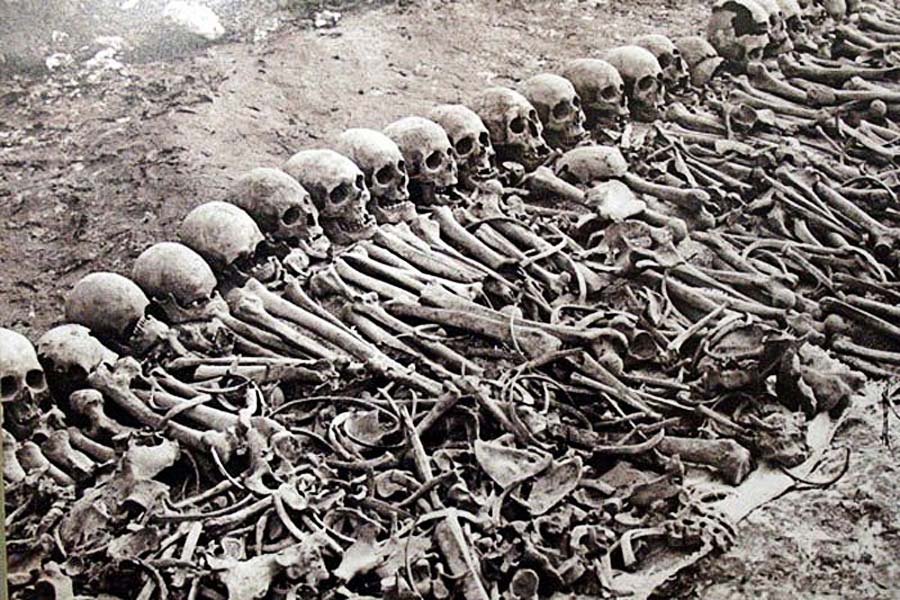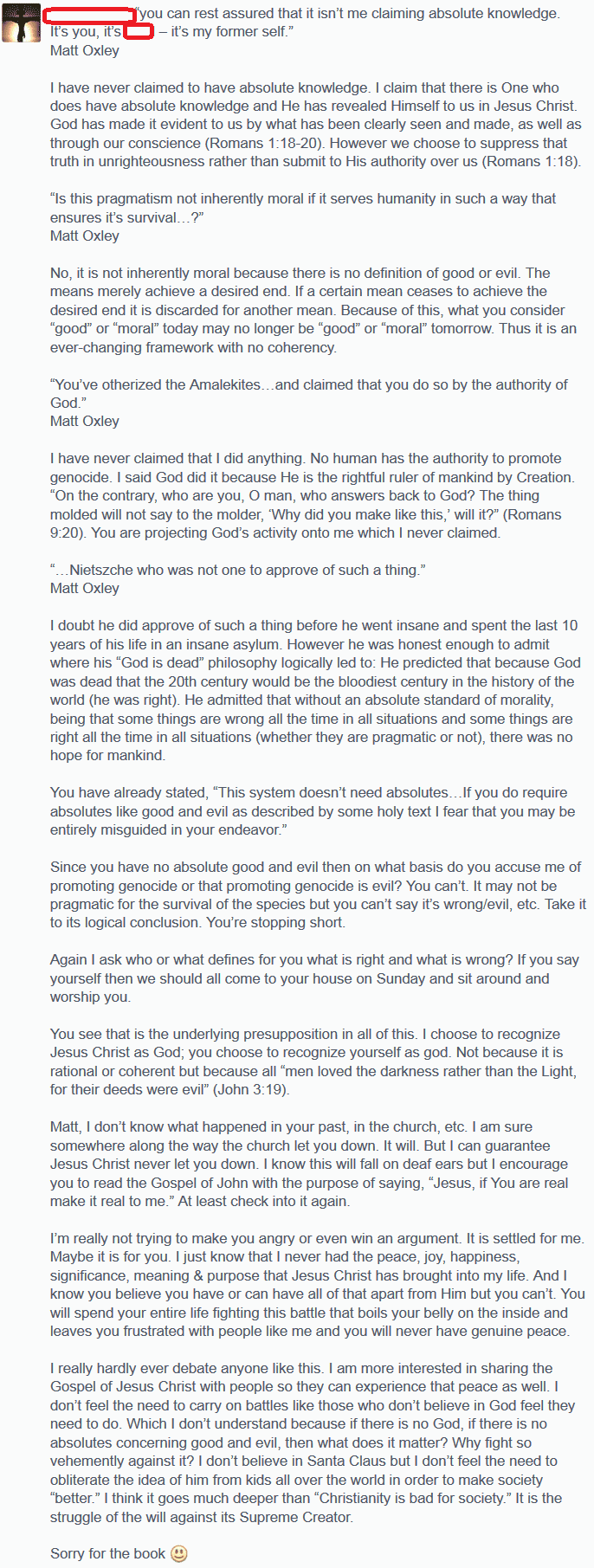I don’t spend the time on Facebook and Twitter making trouble (read: attempting to dialogue with Christians) that I once did . I do, on occasion, find reason enough to interject my opinions into discussions with believers and one such instance occurred rather recently.
Morality is a subject many Christians feel they have the upper hand over the atheist on, it would seem that having a single and all powerful moral lawgiver gives one the ability to diminish the moral grounds upon which others stand – especially those whom don’t claim to abide by the rules given them by a supreme being.
Below is a screenshot of a conversation I got involved with that turned into a morality debate – as I expected. I often feel the need to discuss morality when it comes up because I’ve seen morality expressed in what I would call a more superior form thru atheists and Humanists than thru Christians since leaving the faith – not as an overlapping general statement about Christians, but as an observation about mature atheists and humanists. All communities, of course, contain within them examples of abhorrent behavior and so it is never my prerogative to hold those things against the members of their respective communities, unfortunately the same cannot always be said about my faithful counterparts.
The individual I’m debating here is a local pastor – I think we’ve shaken hands once or twice, but beyond that we’ve no real experience with one another. He doesn’t know my story and I’m not sure if he cares to – and I think it’s very important to point out that I don’t ever believe he’d actually cause harm to another individual unless it were in order to protect his family. I don’t believe he would, in actuality, condone racist genocide – but he has provided us with a prime example of good people practicing cognitive dissonance and using the license of religion to justify atrocious things, as he defends genocide when he believes it has been sanctioned by his own god (in the example of the Amalekites) but in the next breath calls genocide the result of relativistic morality (in the example of Hitler). I do think I’m successful in proving that in some cases God and genocide go hand in hand and that empathetic moral systems which, as a general rule deplore the otherization of people based on their race and creed, are far less likely to result in the needless deaths of men, women, and children.
I’ve hidden all the names involved, save for mine – to protect them from any backlash from the internet. I’m obviously very out and open about my unpopular stances in my small Georgia town and for the most part this hasn’t been to my detriment, furthermore – I’m willing to deal with any negative impact that might arise from simply having a wildly different view from the status quo.
After I decided to post this and started working on editing out all the names the pastor made one final response, so I decided that I should include that here and rather than rebut it on his page – take the time to do that here:
I’m claiming, rather than that you posses absolute knowledge, that you have an internal dialog with something that you perceive that does. You call that god. So – you are relationally able to attain knowledge that others, not privy to this internal dialog, are not capable of attaining. I’m using a bit of literary license, but by comparison to me – your claims of knowledge are far more expansive than my own simply by claiming to know the one who knows all…I only know a guy who knows a guy..I’m twice removed from this knowledge holder (and I’m uncertain of your claim).
Good and evil – while I’m not willing to give you a list of all the things that qualify as either, can be defined. We’ve used dictionaries for hundreds of years and an agreement in the use of common language is what makes it useful to those who speak it. Simple definitions like “Good is that which does or promotes goodness and harmony” or “evil is that which does or promotes a lack of goodness and disharmony” are sufficient for every day use – more strict definitions really serve little purpose if our goal is harmony vs disharmony and it can generally be agreed upon by society that harmony is more desirable than it’s opposite.
In your defense of genocide – or rather, your god’s prompting of genocide (because there’s some distinction I guess?) I’m merely trying to point out the convenience of your position: Genocide is bad unless of course god prescribes it. Funny thing though – God always prescribes genocide for one’s enemies, he always seems to hate the same people his followers hate. You can mull over that one for yourself bit, but there’s a probable reason for the synergy between his hates and your hates. This is the reason I bothered to get involved with this discussion in the first place; there’s nothing consistent about your alleged consistency – either genocide is right or it’s wrong and here you’ve said it’s both right and it’s wrong depending on where the command to pull it off comes from. It sounds as if God is merely a license to do terrible things that empathy alone simply wouldn’t allow – god is a numbing agent for the conscious when you need an excuse to obliterate an entire society. Humanism – an empathetic moral philosophy is consistent. God and genocide are compatible. Humanism and genocide are not.
It’s so clear that neither of us are experts on Nietzsche and that he doesn’t even belong in this discussion.
My past isn’t so relative to this discussion but I will spend a few moments on it:
While I loved the church and can be accused of still caring very much for her well-being, relying on the consistency and kindness of individuals to determine the trustworthiness and truth of correctness of a belief system is foolishness. I was never a fool. My life is as significant as I’m willing to work for, it means as much as it means to the people around me who my life effects, and peace, joy, and happiness as well as anger, frustration, and id-crushing depression are all a part of my life as much as they are anyone else – as I’m as much a human as the next and my life is as full of the highs and lows of any other life.
I don’t believe in God or Jesus Christ simply because I cannot force myself to do so – I tried. I tried to believe for a long time, I did believe for a long time before that – but once that belief was gone from me I couldn’t get it back. No amount of begging or praying would fix it and no one has wanted to undo his doubts more than me. No one on this planet that has ever lived will understand what it was like to lose my god, and every part of me still aches to this day when I remember how deep and how strong his love was. It took some years to recognize that he was only a reflection of me – and that his deep and strong love was only an avenue through which to share my own, and now I can do just that without him.
The why’s about these sorts of discussions and my motivations for them are pretty easy to explain – but likely harder to understand if you aren’t in my shoes. God was real to me and he isn’t now – the process from one to another was more difficult than words can express. For one, I know that many people within our own community have their own doubts that they deny – unsure of what facing them will mean. I do what I do so that people in fear of entering the process of questioning their faith or who are already in the midst of that process can know that there are good days ahead and that at the end of the darkness there is light, and freedom. It’s hard to believe that in the midst of it – but it’s true and I know it. I also dialogue in the way that I do because I find that dialogue is the way forward for society, it is the ultimate expression of humanism; sitting across from an individual you disagree with vehemently and hashing out your differences politely and respectfully. Lastly – you can acknowledge this or not, but your life and your decisions and your beliefs have an impact on mine and on the people that I care about due to an inherent belief that the rest of the nation ought to abide by the same inconsistent moral standards of sexuality, life bonding, alcohol use, and any number of stringent and inane moral laws that the Bible prescribes for Christians because it’s more important to limit my freedom and the freedom of the people that I love than it is to tend to your own “sin”. It’s important to me that consenting adults be able to do the things they want to do with one another – and yet your majority in this nation and in this state prevents the minority from doing the things that make them happy and that harm none. That’s a travesty in 2014 and I’m glad that I’ll be part of the first generation of Americans to see this sort of mindset and these archaic Sharia-like laws on their way out.
In the end: I’m glad that most Christians are better people than their god. I’m sorry that you don’t know that about yourself and that you cannot yet cast him aside.
Maybe one day.
Question. Everything.


